Why Is My Dogs Poop Orange?
Post Date:
December 10, 2024
(Date Last Modified: December 10, 2024)
Noticing unusual changes in your dog’s health can be worrying. A common concern among dog owners is a change in the color of their pet’s poop. If you’ve found yourself asking, “Why is my dog’s poop orange?”, you’re not alone. Understanding the potential causes behind this color change is essential for your furry friend’s well-being.
Dietary Factors
One primary reason for orange stool in dogs is dietary changes. A recent switch in food brands or new treats may affect the color of their poop. Ingredients rich in beta-carotene, such as carrots, sweet potatoes, and pumpkin, can lead to an orange hue. While these foods are generally safe, excessive amounts may result in noticeable changes in stool color.
If you’ve recently introduced new foods, consider moderation. A gradual transition to new foods helps avoid digestive issues, and monitoring portion sizes can maintain healthy stool color. If the orange poop persists after dietary adjustments, it could signal a deeper issue.
Dehydration
Dehydration can also impact stool color. Insufficient water intake may cause your dog’s body to absorb more water from food, resulting in concentrated stool, which can appear orange. Ensuring your dog stays hydrated is vital for their overall health and can help maintain normal stool color.
Signs of dehydration include dry gums, lethargy, and reduced skin elasticity. Encourage your dog to drink more water by providing fresh water at all times and adding wet food to their diet. If signs of dehydration continue or stool color does not normalize, veterinary advice is recommended.
Digestive Issues
Digestive problems can significantly affect stool color. Conditions like pancreatitis, inflammatory bowel disease, or infections may lead to changes in fecal color. If your dog’s poop is orange and accompanied by symptoms such as vomiting, diarrhea, or a change in appetite, consulting your veterinarian is crucial. These symptoms could indicate a serious underlying condition.
For instance, pancreatitis causes inflammation of the pancreas, leading to digestive disturbances. Dogs with this condition may experience abdominal pain, decreased appetite, and changes in stool color. If illness is suspected, seeking professional help is the best course of action.
Liver Issues
The liver plays a critical role in your dog’s health, and any issues with this organ can have serious consequences. Liver dysfunction may manifest as changes in stool color, including an orange tint, due to the liver’s impaired processing of substances. If your dog’s poop is orange and they show additional symptoms such as jaundice (yellowing of the skin or eyes), lethargy, or loss of appetite, immediate consultation with your veterinarian is essential.
Liver diseases can range from mild to severe, and prompt diagnosis and treatment are crucial for your pet’s well-being. Your veterinarian may recommend blood tests, ultrasounds, or other diagnostic procedures to assess liver health.
Parasites
Intestinal parasites can also cause changes in stool color. While typically linked to diarrhea, some parasites may result in varying stool colors, including orange. If you suspect your dog may have parasites, look for signs such as weight loss, bloating, or a change in appetite. A fecal examination by a veterinarian can help identify any potential infestations.
Maintaining good hygiene and regular deworming can help prevent parasites. Keeping your dog’s living area clean and protecting them from potential sources of infection is essential. If orange poop occurs alongside signs of parasites, veterinary intervention is necessary for effective treatment.
Medication Effects
Certain medications can impact stool color, possibly causing changes in digestion or stool consistency. If your dog has recently started a new medication and you notice orange stool, discuss this with your veterinarian. They can determine whether the medication is responsible for the change and if adjustments are needed.
Understanding potential side effects of medications can alleviate concerns and help ensure your pet receives optimal care. Always communicate any issues with your veterinarian for the best outcome.
When to Seek Veterinary Care
Monitoring your dog’s overall health alongside changes in stool color is essential. If orange poop is accompanied by concerning symptoms such as lethargy, vomiting, diarrhea, or changes in appetite, seeking veterinary care is vital. Early intervention often leads to better outcomes and can help prevent more serious health issues.
Even if your dog seems healthy, consulting your veterinarian if orange stool persists beyond a few days is wise. Changes in fecal color can indicate underlying health concerns, and a thorough examination can provide peace of mind.
Maintaining a Healthy Diet
A well-balanced diet is crucial for your dog’s health and can prevent many digestive issues. Seek recommendations for high-quality dog food that meets your pet’s specific needs. Be mindful of treats and table scraps, as these can also affect stool color.
Regularly monitoring food intake and changes in stool will help catch potential issues early. A healthy diet, combined with adequate hydration and regular veterinary check-ups, contributes to your dog’s overall well-being.
Being Proactive About Your Dog’s Health
Proactively managing your pet’s health is essential. Recognizing normal and abnormal signs helps you respond quickly to potential issues. If you find yourself questioning, “Why is my dog’s poop orange?”, take the time to assess your dog’s overall health. Pay attention to their diet, hydration, and any behavioral changes. If something seems off, reach out to your veterinarian. Your dog relies on you for their health and happiness, and being informed is a significant part of that responsibility.
Understanding the nuances of your pet’s health is vital. Recognizing that orange poop can result from various causes—from dietary changes to serious health conditions—ensures that you can act in your dog’s best interest. By being attentive and seeking veterinary care when necessary, you can help ensure a happy and healthy life for your furry companion.






